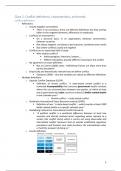Class 2 - Conflict defini1ons, characteris1cs, and trends
Conflict defini,ons
- Reflec,ons
o Usually nega,ve connota,on
§ There is no consensus, there are different defini,ons but they overlap
(oCen in the nega,ve elements, differences in emphases)
o Conflicts are everywhere!
§ On a personal basis, in an organiza,on, between communi,es,
between countries
§ Not always nega,ve, not always a bad outcome, some,mes even useful
§ But violent conflicts usually are nega,ve
o Conflicts are an important field of study
§ Who studies conflict?
• Anthropologists, historians, lawyers, …
• Different disciplines provide different meaning to the conflict
o No agreement on exact defini,on
§ But as Cramer (2006) notes: "defini,onal frames are oCen more than
purely descrip,ve"
o Empirically and theore,cally relevant how we define conflict
§ Sambanis (2004) - very few variables are robust to different defini,ons
- Mul,ple defini,ons
o Uppsala Conflixt Database (UCDP)
§ Defini,on of armed conflict: "a state-based armed conflict is a
contested incompatability that concerns government and/or territory
where the use of armed force between two par9es, of which at least
one is government of a state, results in at least 25 baTle-related deaths
in one calendar year."
o Armed conflict --> state-based conflict
o Stockholm Interna,onal Peace Research Ins,tute (SIPRI)
§ Defini,on of war: "a state-based conflict … which reaches at least 1000
baBle-related deaths in a specific calendar year."
o Heidelberg Ins,tute for Interna,onal Conflict Research
§ "A poli9cal conflict is a posi9onal difference between at least two
asser9ve and directly involved actors regarding values relevant to a
society (the conflict items) which is carries out using observable and
interrelated conflict measures that lie outside established regulatory
procedures and threaten core state func9ons, the interna9onal order,
or hold the prospect of doing so."
o Fourth defini,on
5
, - Reflec,ons
o Casualty threshold is very arbitrary
o Absolute casualty numbers lead to skewed conflict datasets
o Is baale-related deaths an appropriate measure? Should we also consider
'direct' civilian deaths? Or even 'indirect' civilian deaths? (e.g., famine, disease)
o What if civilians are directly being targeted? (UCDP One-Sided Violence) What
about genocide? Civilians killing civilians (e.g., Rwanda)
§ One-Sided violence: "One-sided violence is the use of armed force by
the government of a state or by a formally organized group against
civilians which results in at least 25 deaths. Extrajudicial killings in
custody are excluded."
• Example: rebellion group
o Is there a beaer approach or conflict defini,on?
Conflict characteris,cs
- Explana,on of graphs: conflict, poverty and development
o Slide 18
§ If GDP per capita is 250: 16% chance of observing a new conflict
§ If GDP per capita is 500: 8% chance of observing a new conflict
- How can we explain this rela,onship? (lower GDP and increase of chance of conflict
outbreaks)
o Conflict, poverty and development
§ Wealthier states are beaer able to protect assets --> rebellion has less
chance of success (Fearon and Lai,n)
• Less incen,ve to mobilize against the state
§ In poor states the opportunity costs for joining a rebellion are lower and
therefore more feasible --> more rebellions and conflict (Paul Collier)
§ Poverty causes violence --> scarcity leads to migra,on and fight over
scarce resources (Homer-Dixon)
§ Spurious rela,onship --> correla,on might pick up other features of
these countries
§ Reversed causality --> rich countries may be rich because they have not
had conflict
§ Conflict trap:
• Severe economic consequences might lead to violence.
Erup,on of violent conflict -> leads to severe economic and
social consequences (e.g. lower economic growth). E.g. Once
countries had a conflict, the rate of reoccurring conflict goes to
35%. Therefore, certain countries can be trapped in the conflict
again and against, since conflicts are provoked by severe
economic situa,on, which might be again provoked by conflicts.
• Why conflict occurs and why it persists
• Erup,on of violent conflict <--> sever economic and social
consequences (e.g., lower economic growth) & legacy of
conflict
6




